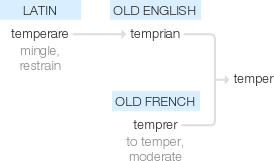Temper
Old English temprian ‘bring something into the required condition by mixing it with something else’, from Latin temperare ‘mingle, restrain’. Sense development was probably influenced by Old French temprer ‘to temper, moderate’. The noun originally denoted a proportionate mixture of elements or qualities, also the combination of the four bodily humours, believed in medieval times to be the basis of temperament, hence temper (sense 1 of the noun) (late Middle English). Compare with temperament.
wiktionary
From Middle English temperen, tempren, from Old English ġetemprian, temprian, borrowed from Latin temperō(“I divide or proportion duly, I moderate, I regulate; intransitive senses I am moderate, I am temperate”), from tempus(“time, fit season”). Compare also French tempérer. Doublet of tamper. See temporal.
etymonline
temper (v.)
late Old English temprian "to moderate, bring to a proper or suitable state, to modify some excessive quality, to restrain within due limits," from Latin temperare "observe proper measure, be moderate, restrain oneself," also transitive, "mix correctly, mix in due proportion; regulate, rule, govern, manage." This is often described as from Latin tempus "time, season" (see temporal), with a sense of "proper time or season." But as the root sense of tempus seems to be "stretch," the words in the "restrain, modify" sense might be from a semantic shift from "stretching" to "measuring" (compare temple (n.1)). Meaning "to make (steel) hard and elastic" is from late 14c. Sense of "tune the pitch of a musical instrument" is recorded from c. 1300. Related: Tempered; tempering.
temper (n.)
late 14c., "due proportion of elements or qualities," from temper (v.). The sense of "characteristic state of mind, inclination, disposition" is first recorded 1590s; that of "calm state of mind, tranquility" in c. 1600; and that of "angry state of mind" (for bad temper) in 1828. Meaning "degree of hardness and resiliency in steel" is from late 15c.
